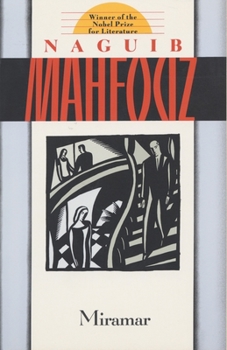Miramar
Select Format
Select Condition 
Book Overview
This highly charged fable set in Alexandria, Egypt, in the late 1960s, centers on the guests of the Pension Miramar as they compete for the attention of the young servant Zohra. Zohra is a beautiful peasant girl who fled her family to escape an arranged marriage. She becomes the focus of jealousies and conflicts among the Miramar's residents, who include an assortment of radicals and aristocrats floundering in the wake of the Egyptian revolution...
Format:Paperback
Language:English
ISBN:038526478X
ISBN13:9780385264785
Release Date:January 1993
Publisher:Anchor Books
Length:192 Pages
Weight:0.43 lbs.
Dimensions:0.5" x 5.3" x 8.0"
Customer Reviews
6 ratings
A Reflective Book
Published by Sophie , 2 years ago
I really enjoyed this novel.
A landlady, a servant girl, five men--and a death
Published by Thriftbooks.com User , 16 years ago
At the center of Mahfouz's "Miramar" is the peasant girl Zohra, who flees to Alexandria in order to escape the traditionalist mores of her family. She finds employment as a servant at a pension, where five boarders have recently rented apartments, and "it is precisely her determination to emancipate herself, that the men about her admire...or resent," John Fowles writes in an introduction to the novel. "She stands for Egypt itself." The story of the pension--and the killing that propels its plot--is told from four perspectives, each one revealing not only more about the incident but also details about the political ties and the backgrounds of the inhabitants of the Pension Miramar. At the opening of the novel, Mariana, the landlady and a widow twice over, lets a room to Amir, a retired journalist and lifelong bachelor, "driven into cold and meaningless neutrality" because of party differences by the likes of the "Muslim Brethren, whom I did not like [and] the Communists, whom I did not understand." One by one, the other four lodgers, as well as Zohra, present themselves, until the pension is full and the stage is set. For Zohra, the Miramar becomes a safe house and a trap. Her family members attempt to flush her out of the building, but Mariana and the lodgers protect her from their rash, desperate attempts. But among her protectors she also becomes a source of jealousy. The two older residents regard the young woman as they would the past--what was or what might have been: youth, beauty, lost opportunities. The three younger men see her as representing the future: liberation, openness, confidence. They all--old and young--vie for Zohra's attentions, and one of them dies, leaving everyone a suspect. "Everyone fought with him," Amir says of the victim. Indeed, like the various factions of Egypt, they all fought with each other, making and breaking alliances according to their shifting internecine struggles--both cultural and political. While the novel is a concise page-turner and a masterful character study, the whodunit aspect is not even the point; instead, "Miramar" is a window looking back on the post-Revolution Egyptian psyche and the disillusionment of its partisan elements.
Great Insight into Egypt
Published by Thriftbooks.com User , 18 years ago
I loved the book and its depiction of daily life in Egypt. you can almost feel wanting to visit cairo while reading it. I felt the same reading Arab Voices.
An Egyptian Rashomon
Published by Thriftbooks.com User , 20 years ago
Pension Miramar engages a fellaha (a young peasant woman), who ran away from her village to avoid a forced marriage.She becomes the centre point of the attention of all the pension's inhabitants, because of her simplicity and natural beauty, but also for her ambition to get out of her traditional role of maid without education. The fellaha's battle to escape her humble fortune is mingled with her emotional love life and the more or less violent advances of some residents.Like Kurosawa in his magisterial movie 'Rashomon' (based on a short novel by Ryunosuke Akutagawa), the evolving story is told from (here) four different angles (persons), revealing slowly the real motives behind the different clashes.This novel contains some typical Mahfouz characters, like the career man, the wealthy playboy or the impostor ('employed by one master, serving secretly another').Some themes are also familiar: 'If you have power, you have everything', or 'Everyone else around us behaves as if they didn't believe in God's existence'.The novel is also a reflection on the failure of the Egyptian Revolution of 1952: 'But was there an alternative? Only the Communists or the Muslim Brotherhood.'This is surely a worth-while read, but the book has not quite the finesse of its Japanese example.
What a plot and so many twists too-----Brilliant
Published by Thriftbooks.com User , 25 years ago
It was a fascinating read. The place,the time and the characters-- only mahfouz can write a book this way
Excellent.
Published by Thriftbooks.com User , 26 years ago
No one, but Naguib Mahfouz can depict internal pain and human struggles with such elegance.





